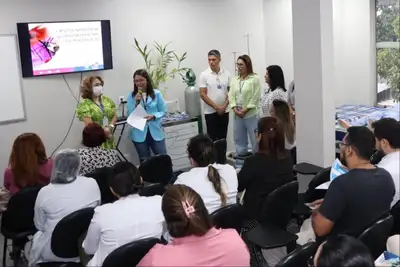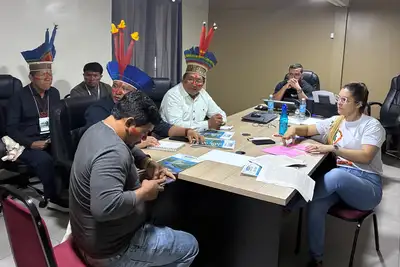Ideflor-Bio and Military Police strengthen partnership for the protection of conservation units in Pará
During the meeting, strategies were aligned to intensify inspection, monitoring, and environmental education operations in protected areas

Expanding and strengthening joint actions within state conservation units was one of the objectives of the meeting between leaders of the Institute of Forest Development and Biodiversity of Pará (Ideflor-Bio) and the Military Police of Pará, through the Environmental Police Command (CPA). The meeting, on Thursday (11), in Belém, also addressed the negotiations for the celebration of a Technical Cooperation Agreement (ACT) to reinforce environmental protection and combat crimes against nature.
Present at the occasion were the president of Ideflor-Bio, Nilson Pinto; the manager of the Xingu Administrative Region of Ideflor-Bio, Marco Aurélio Oliveira; the commander of the CPA, Colonel Orlandino; and the deputy commander, Lieutenant Colonel Miranda. The institutions aligned strategies to intensify inspection, monitoring, and environmental education operations in protected areas.
The CPA, through its Environmental Police Battalions (BPA), already operates in several state conservation units, such as the Araguaia Environmental Protection Area (APA) and the Serra dos Martírios/Andorinhas State Park, in São Geraldo do Araguaia; in the Tabuleiro do Embaubal Wildlife Refuge (Revis), in Senador José Porfírio; and in the Trombetas State Forest (Flota), in addition to other strategic areas in the Pará territory.
Consolidation - According to the president of Ideflor-Bio, the formalization of the agreement will be a milestone in consolidating the state conservation policy. “The partnership with the Military Police, through the CPA, reinforces our commitment to protect Pará's natural heritage. By joining forces, we will have more efficiency in inspection actions and more security for our conservation units,” highlighted Nilson Pinto.
The expectation is that joint operations will become more frequent and comprehensive, reaching hard-to-access regions and ensuring greater state presence in the territories. The agreement also provides for the possibility of educational actions, guiding local communities, strengthening the culture of respect for the environment.
For the manager of the Xingu Administrative Region, the measure will bring significant advances in the management of protected areas. “The signing of the ACT between the institutions will contribute to the advancement of guidance, monitoring, and inspection actions within the units. This is a fundamental step to ensure concrete results in environmental preservation,” stated Marco Aurélio Oliveira.












